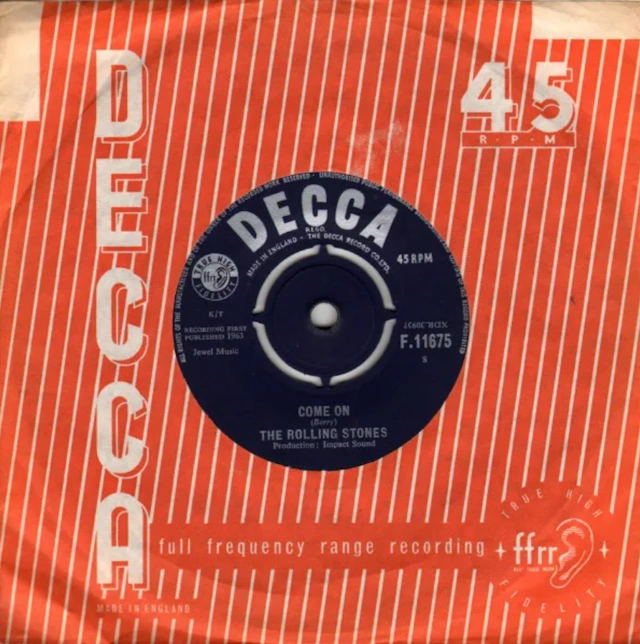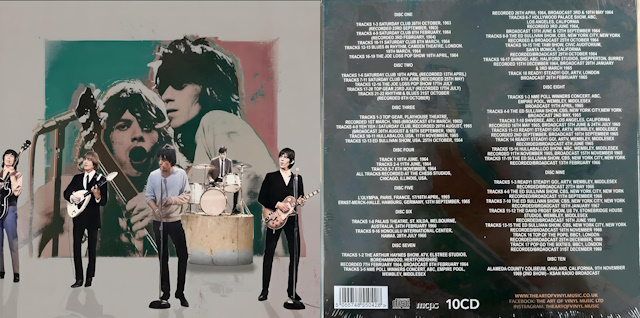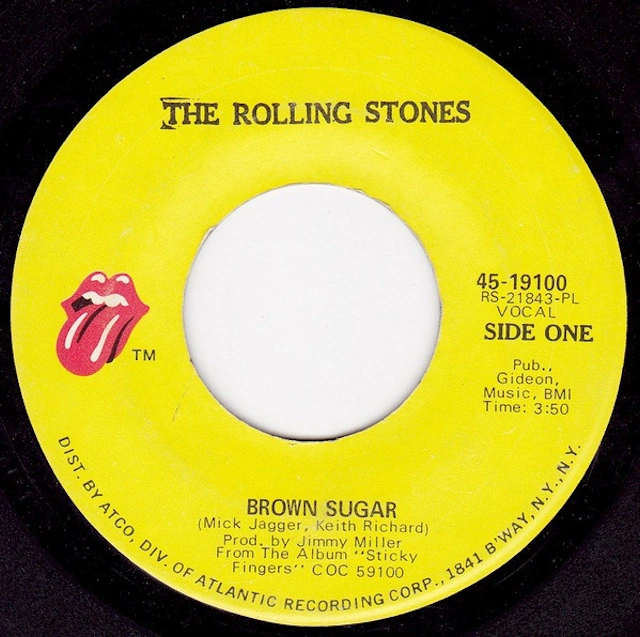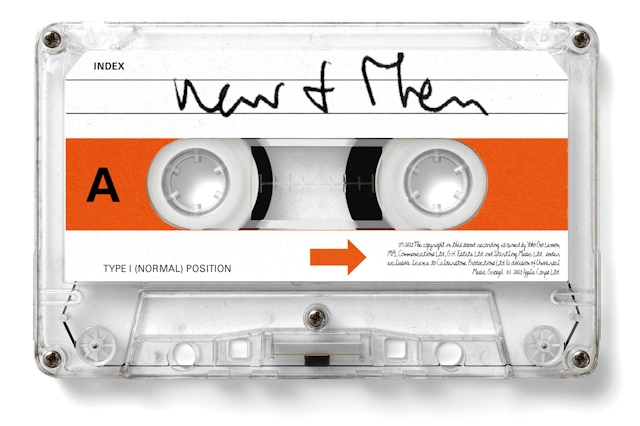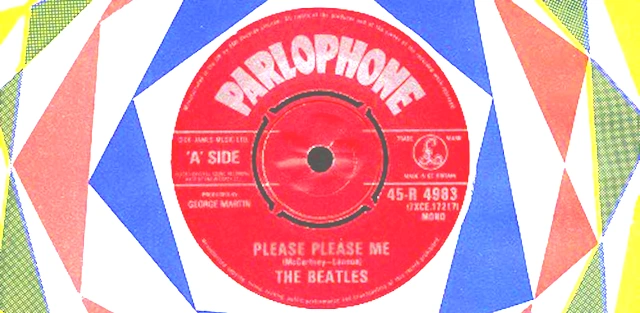Love Me Do tells the story of Come On, the song written by Chuck Berry and later recorded by The Rolling Stones as their first single release.
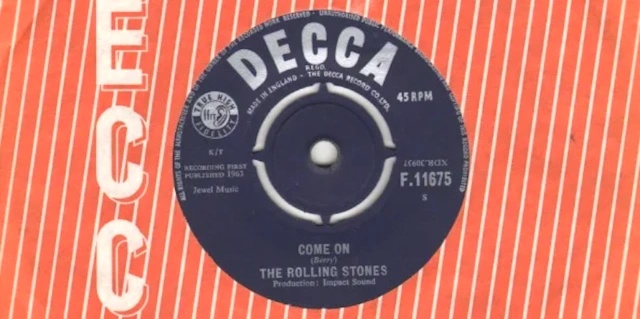 Come On is a classic rhythm and blues song written and originally performed by the legendary Chuck Berry in 1961. It was later famously covered by The Rolling Stones in 1963, marking their debut single and the beginning of their lengthy career.
Come On is a classic rhythm and blues song written and originally performed by the legendary Chuck Berry in 1961. It was later famously covered by The Rolling Stones in 1963, marking their debut single and the beginning of their lengthy career.
The song is a quintessential example of Berry’s signature style, blending upbeat rhythms, clever lyrics, and infectious guitar riffs that would go on to influence countless musicians and shape the sound of rock and roll.

Chuck Berry’s Come On
Chuck Berry’s original version of Come On is a lively, uptempo track that showcases his distinctive guitar playing and storytelling prowess. The song’s lyrics tell the tale of a man lamenting his romantic woes, as his girlfriend has left him and his car has broken down. Berry’s delivery is both playful and poignant, capturing the frustration and humor of the situation.
The opening guitar riff is instantly recognizable, a hallmark of Berry’s ability to craft memorable hooks that resonate with listeners… in much the way Keith Richards would go on to do, in his own style. The song’s structure is simple yet effective, with a driving rhythm section and Berry’s trademark guitar solos that highlight his technical skill and innovative approach to the instrument.
The Rolling Stones’ Come On
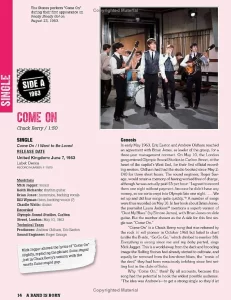 When The Rolling Stones decided to cover Come On for their first single, they brought their own raw energy and youthful enthusiasm to the track. At the time, the band was heavily influenced by American blues and R&B, and their version of Come On reflects this passion.
When The Rolling Stones decided to cover Come On for their first single, they brought their own raw energy and youthful enthusiasm to the track. At the time, the band was heavily influenced by American blues and R&B, and their version of Come On reflects this passion.
Mick Jagger’s vocals are more aggressive and edgy compared to Berry’s smoother delivery, and the band’s arrangement is slightly faster and more frenetic. Keith Richards’ guitar work pays homage to Berry’s original riffs while adding a gritty, garage-rock edge that would become a defining characteristic of The Rolling Stones’ sound.
The Success of Come On
The Rolling Stones’ cover of Come On was not a commercial smash, but it was a crucial stepping stone for the band. It introduced them to the music scene and helped them gain traction in the competitive world of 1960s rock and roll.
 The single’s release was followed by their appearance on Thank Your Lucky Stars, a favourite British TV pop music show, which further boosted their visibility. While the Stones would later achieve greater success with their own original material, their decision to record Come On as their debut single was a nod to their musical roots and a tribute to one of their biggest influences, Chuck Berry.
The single’s release was followed by their appearance on Thank Your Lucky Stars, a favourite British TV pop music show, which further boosted their visibility. While the Stones would later achieve greater success with their own original material, their decision to record Come On as their debut single was a nod to their musical roots and a tribute to one of their biggest influences, Chuck Berry.
Come On… in Retrospect
In retrospect, Come On serves as a bridge between two generations of rock and roll. Chuck Berry’s original version is a testament to his pioneering role in the genre, while The Rolling Stones’ cover highlights the enduring appeal of Berry’s music and its ability to inspire new artists. The song’s themes of heartbreak and resilience are universal, and its infectious energy continues to captivate audiences decades after its release. Whether in Berry’s hands or The Rolling Stones’, Come On remains a timeless piece of rock and roll history, embodying the spirit and creativity that define the genre.
RECENT POSTS

Bio: Ronnie Wood
Love Me Do brings you a brief bio of Ronnie Wood, from his time with The Faces to The Rolling Stones, and his artwork and personal life.

Bio: Mick Jagger
Love Me Do provides a brief profile of Mick Jagger of the Rolling Stones from his early life through his rise to fame and to his musical legacy and honours.

Bio: Keith Richards
Love Me Do tells the story of Keith Richards of the Rolling Stones from his early life through his rise to fame to his musical legacy and honours.

Book Review: The Rolling Stones: The Brian Jones Years
Love Me Do reviews The Rolling Stones: The Brian Jones Years (Every Song from Every Session) by Peter Checksfield, an in-depth look into Brian Jones’ influence.

Bio: Mike d’Abo
Love Me Do tells the story of Mike d’Abo, who replaced Paul Jones as lead singer of the 1960s pop group Manfred Mann, and was also an accomplished songwriter.

Bio: Keith Relf
Love Me Do tells the story of Keith Relf, lead singer with The Yardbirds and later Renaissance, and whose life was cut tragically short.

Book Review: Life by Keith Richards
Love Me Do reviews Life by Keith Richards, the warts and all autobiography by the Rolling Stones lead guitarist and rock legend.
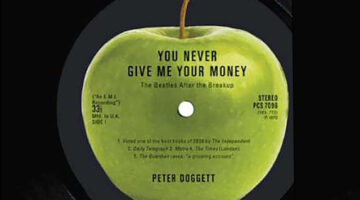
Book Review: You Never Give Me Your Money
Love Me Do reviews the book You Never Give Me Your Money by Peter Doggett, which provides an in-depth look at The Beatles’ breakup and their financial dealings.

Book Review: Here Comes the Sun
Love Me Do reviews Here Comes the Sun: The Spiritual and Musical Journey of George Harrison by Joshua M. Greene.

LP Review: Let It Be – The Beatles
Love Me Do reviews the Beatles final LP release, Let It Be, with such tracks as Get Back, Let It Be, Across the Universe and The Long and Winding Road.

LP Review: Abbey Road – The Beatles
Love Me Do reviews The Beatles’ Abbey Road LP with such tracks as Something, Here Comes the Sun, Come Together, Octopus’s Garden and Maxwell’s Silver Hammer.

LP Review: The White Album – The Beatles
Love Me Do reviews The Beatles’ LP known as The White Album with such tracks as Blackbird, While My Guitar Gently Weeps, Bungalow Bill, Julia and I Will.
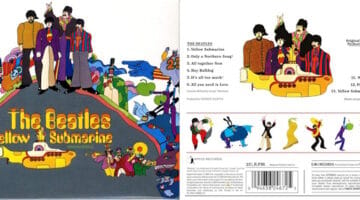
LP Review: Yellow Submarine – The Beatles
Love Me Do reviews The Beatles’ Yellow Submarine LP, with songs such as Yellow Submarine, All You Need Is Love, Hey Bulldog and All Together Now.

LP Review: Magical Mystery Tour – The Beatles
Love Me Do reviews the Beatles’ Magical Mystery Tour LP with such songs as Fool on the Hill, I Am the Walrus, Penny Lane and All You Need Is Love.

LP Review: Sgt. Pepper’s Lonely Hearts Club Band – The Beatles
Love Me Do reviews the Beatles’ best album, Sgt Pepper’s Lonely Hearts Club Band, with such tracks as She’s Leaving Home and With a Little Help from My Friends.
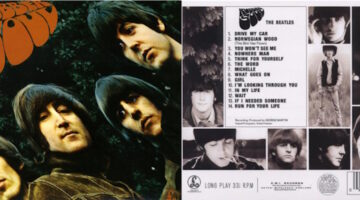
LP Review: Rubber Soul – The Beatles
Love Me Do reviews the Beatles LP Rubber Soul with track highlights such as Norwegian Wood, Michelle, Nowhere Man, Girl, Drive My Car and In My Life.
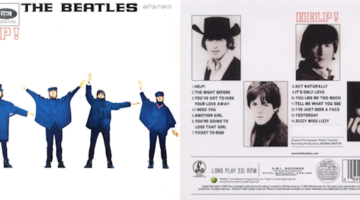
LP Review: Help! – The Beatles
Love Me Do reviews the Beatles’ fifth LP, the soundtrack to their second film, Help!, with such hits as Ticket to Ride and Yesterday, and Ringo’s Act Naturally.
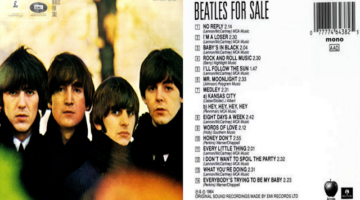
LP Review: Beatles for Sale – The Beatles
Love Me Do reviews the Beatles’ fourth LP, Beatles for Sale, with covers of six songs including Words of Love, Honey Don’t and Rock and Roll Music.
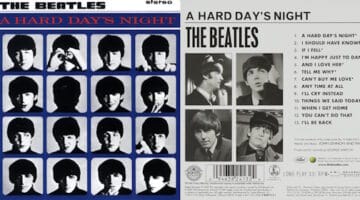
LP Review: A Hard Day’s Night – The Beatles
Love Me Do reviews the Beatles’ third LP, A Hard Day’s Night, the group’s first LP to have all original songs including And I Love Her and Can’t Buy Me Love,

LP Review: Revolver – The Beatles
Love Me Do reviews the innovative Beatles album Revolver, their revolutionary work with its ground-breaking studio techniques and the precursor to Sergeant Pepper.
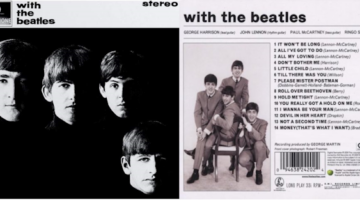
LP Review: With the Beatles – The Beatles
Love Me Do reviews With the Beatles, the second album by The Beatles with such classic tracks as All My Loving, Till There Was You, It Won’t Be Long and Money.






